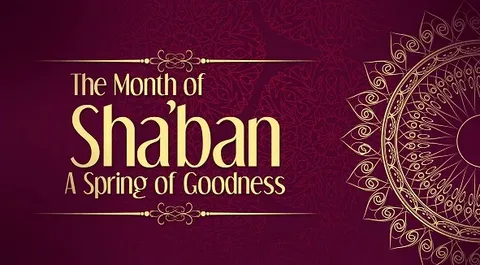The Islamic calendar holds great spiritual significance for Muslims, with each month offering unique blessings and opportunities for worship. Among these months, Shaban stands out as a time of preparation and spiritual growth. But what does the Quran say about the month of Shaban? Let’s dive into the Quran, Sunnah, and Islamic traditions to uncover the significance of this month.
The Significance of Shaban

Shaban, the eighth month of the Islamic calendar, holds significant spiritual and cultural importance for Muslims worldwide. It is considered a preparatory month leading up to Ramadan, the holiest month in Islam. Here are some key aspects of the significance of Shaban:
1. Preparatory Month for Ramadan
Shaban serves as a time for Muslims to mentally, physically, and spiritually prepare for Ramadan. It is a chance to increase acts of worship, such as prayer, fasting, and recitation of the Qur’an, as a prelude to the intense devotion of Ramadan.
2. Fasting in Shaban
The Prophet Muhammad (peace be upon him) was known to fast frequently in Shaban, more so than in any other month outside of Ramadan. A hadith narrated by Aisha (RA) mentions:
“I never saw the Messenger of Allah complete a month’s fast except for Ramadan, and I never saw him fast more in any month than he did in Shaban.”
(Sahih al-Bukhari, Sahih Muslim)
Fasting in Shaban is seen as an opportunity to earn rewards and spiritually prepare for the obligatory fasts of Ramadan.
3. The Night of Mid-Shaban (Laylat al-Bara’ah)
The 15th night of Shaban, known as Laylat al-Bara’ah (the Night of Forgiveness), is considered by many Muslims as a night of mercy, forgiveness, and blessings. Although its significance varies among Islamic scholars, it is often observed with prayers, supplications, and seeking forgiveness. It is believed to be a time when Allah’s mercy is abundant and when the deeds of individuals are raised.
4. Strengthening the Connection with Allah
Shaban is an opportunity to cultivate good habits and strengthen the connection with Allah through increased worship. Acts such as dhikr (remembrance of Allah), charity, and seeking forgiveness are encouraged. This helps Muslims develop the discipline and spirituality needed for Ramadan.
what does the quran say about the month of shaban

Although the Quran does not explicitly mention Shaban by name, it emphasizes the importance of time, worship, and planning for Ramadan. Verses highlighting the sacredness of months and the need for consistent worship indirectly point to the value of Shaban.
bFor instance, Allah says in the Quran:
“Indeed, the number of months with Allah is twelve [lunar] months in the register of Allah from the day He created the heavens and the earth; of these, four are sacred.” (Surah At-Tawbah, 9:36)
While Shaban is not one of the four sacred months, it holds unique significance as the month preceding Ramadan.
Quranic Emphasis on Time and Months
The Quran frequently reminds believers of the fleeting nature of time and the need to make the most of it. Shaban, falling between the sacred month of Rajab and the holy month of Ramadan, offers Muslims a chance to increase their good deeds and prepare for the intense worship of Ramadan.
The Quran’s Indirect References to Shaban
Shaban is closely tied to Ramadan, the month of fasting ordained in the Quran:
“O you who have believed, decreed upon you is fasting as it was decreed upon those before you that you may become righteous.” (Surah Al-Baqarah, 2:183)
This verse underscores the importance of spiritual readiness, which Shaban facilitates.
The Teachings of Prophet Muhammad (PBUH) About Shaban
The Prophet Muhammad (PBUH) emphasized the importance of Shaban through his actions and teachings. He often referred to it as the month in which deeds are presented to Allah. One hadith states:
“Shaban is the month between Rajab and Ramadan, and it is the month in which deeds are raised to the Lord of the worlds. I like my deeds to be raised while I am fasting.” (An-Nasa’i)
The Night of Mid-Shaban
The 15th night of Shaban, known as Laylat al-Bara’ah (The Night of Forgiveness), holds special significance in Islamic tradition. It is believed to be a night of mercy and forgiveness when Allah decrees the fate of His servants for the coming year. However, Muslims are cautioned to rely on authentic sources and avoid innovations associated with this night.
Acts of Worship in Shaban
The Prophet (PBUH) was known to fast extensively in Shaban, sometimes fasting more than in any other month besides Ramadan. This practice prepares the body and soul for the obligatory fasting of Ramadan.
Night Prayers and Supplications
Shaban is an ideal time to increase night prayers (Qiyam-ul-Layl) and make heartfelt supplications. These acts of worship deepen one’s connection with Allah and set the tone for the intense worship of Ramadan.
Charity and Good Deeds
The month of Shaban encourages acts of charity and kindness. Whether it’s feeding the needy, helping neighbors, or contributing to a cause, every good deed in Shaban brings immense reward.
Preparing for Ramadan
Shaban offers a spiritual reset, helping Muslims cleanse their hearts of grudges, pride, and sins. It’s a time for self-reflection, repentance, and seeking Allah’s mercy.
Developing Habits of Worship
The month serves as a training ground for the rigorous worship of Ramadan. By fasting, praying, and reading the Quran, Muslims build habits that make their Ramadan experience more fulfilling.
FAQs
Is Shaban mentioned directly in the Quran?
No, Shaban is not directly mentioned in the Quran, but its significance is highlighted through the emphasis on time and preparation for Ramadan.
What is the importance of Laylat al-Bara’ah?
Laylat al-Bara’ah, or the Night of Forgiveness, is considered a special night for seeking Allah’s mercy and forgiveness, though authentic traditions should be followed.
How did the Prophet (PBUH) observe Shaban?
The Prophet (PBUH) fasted extensively during Shaban and encouraged acts of worship and charity.
Is fasting in Shaban mandatory?
No, fasting in Shaban is not mandatory but highly recommended as per the Sunnah of the Prophet (PBUH).
What can Muslims do to prepare for Ramadan during Shaban?
Muslims can prepare by fasting, increasing prayers, giving charity, and reflecting on their spiritual goals.
Conclusion
Shaban is a month of immense spiritual potential, bridging the gap between the sacred months of Rajab and Ramadan. While it is not explicitly mentioned in the Quran, its significance is highlighted through the teachings of Prophet Muhammad (PBUH) and the emphasis on time in the Quran. By using this month wisely, Muslims can prepare themselves for the blessings of Ramadan.


